- Home
- Mary Roach
Spook: Science Tackles the Afterlife Page 9
Spook: Science Tackles the Afterlife Read online
Page 9
It’s that minus-all-the-trappings bit that gets me. If you can’t think in words or see or hear, what are you like? Coma victim? Lichen? Nahum shrugs. It’s just an analogy, just a guess. I posed this question to Lui later in the week. He was dubious about the possibility of the informational content of a person’s consciousness leaving the body in any sort of organized form. “Decay heat is not ordered information,” he said. Meaning, I think, that the blip of energy that was your personality may indeed continue to exist after you die, but not in the form of your personality. Not in the form of something you can be or use.
I later relayed to Nahum what Lui said and asked him to comment. “Remember,” I wrote, “in replying to me, pretend you are talking to a seventh-grader.” Nahum disagreed with Lui. His reply ran to a thousand words and would have been understandable to any seventh-grader familiar with Kant, Locke, negentropy as the measure of nonrandomness, and the Enigma encryption machine. Here is the part I understood: “This energy is freely malleable in terms of the physical form it might take…and it is not necessarily the case that any one of them would be ‘preferred.’”
Well, “preferred” in the sense that it would be more fun to be a spirit that can think thoughts and remember memories than to be, say, a black hole or a piece of static electricity. But I decided to leave it be.
Nahum orders bananas Napoleon for dessert, just one more way we’ll never understand each other. We’re back to talking about the box, the system. I realize I forgot to ask him what kind of organism he’s planning to put inside. The dessert arrives, a massive custard download held vertical by wafer shelving.
“So what goes in it?” I’d been assuming a lab mouse.
“Banana pudding, mostly.”
When I get back home and I look at Nahum’s twenty-five-page “Proposal for Testing the Energetics of Consciousness and Its Physical Foundation,” I will picture a plate of banana pudding in a box.
Theoretically, Nahum could sacrifice anything from a bacterium on up. He is leaning toward leeches. “I worked with leeches for a long time. They’re slimy and they latch on to you. They’re a very awful organism. I hated those things!” The couple at the table beside us turn to look at the man who hates leeches.
Last question: What does he think the result will be? Does free-floating consciousness energy exist? “My bias is that it does exist,” says Nahum. “But I would never say that I know that.” He puts down his spoon. “Until I prove it.”
4
The Vienna Sausage Affair
And other dubious highlights of the ongoing effort to see the soul
THE YEAR WAS 1911. Duncan Macdougall, feeling fairly certain he had proved the existence of the soul (by weighing it), now was determined to see it. He wanted, he said in a newspaper article from that year, to know what color* the soul was and how large it was in relation to the body. He wanted to know what route it took on the way out. Did it emanate from the heart or the top of the head, or did it perhaps escape “from the lips,” like a yawn or a cartoon character’s speech? Ignoring the growing disapproval of hospital and asylum boards, Macdougall recruited yet another batch of fading consumptives.
This time around, the dying men lay on an ordinary bed, in a darkened room. At “the supreme moment,” as Macdougall put it, he aimed a strong beam of light along the length of the patient’s body. First he used a swath of white light, and then he experimented with the individual colors of the spectrum, using a long glass prism to separate the bands of light. He tried it with the spectrum horizontal and then with it vertical. He detected nothing.
Macdougall concluded that the soul’s index of refraction is zero, and since all substances except “the ether of space” give some refraction of light, the soul was therefore made of ether. A word about ether. In pre-Einstein days, ether was an accepted concept in physics. It was thought to be the necessary medium for the transmission of electromagnetic waves (light, sound, radio, et cetera). Ether was invisible and undetectable, and it permeated all forms of matter, from man to ottoman.
It was also assumed to be weightless, which threw a hitch into Macdougall’s soul-as-ether idea. Unwilling to abandon his theory, Macdougall went public in 1914 with an “astounding theory,” as one headline put it, about how both ether and souls in fact were subject to the laws of gravity. Because if they weren’t, he reasoned, it would follow that “ever since human beings began to die upon the earth, the complex pathway of the earth around the sun in space…[would be] littered with these…nongravitative spiritual principles.” In other words, if gravity didn’t hold dead souls here on earth, they’d drift away into space, relegated to an eternity among the derelict satellites and NASA detritus. “Can we construct a conception of an orderly future life out of such conditions?”
Equally untenable to Macdougall was the thought of one’s soul being separated from one’s earthly remains by millions of miles. “Between the time of man’s death and the time of the burial of the body, an average of three days, as a spiritual principle he would be separated from his body and the place he died by a distance of nine million miles, the distance the earth would travel in three days’ time.” To a man who spent his adult life five thousand miles away from his parents and siblings in Scotland, you can imagine it was a gloomy proposition.
Macdougall envisioned a giant “earth-accompanying globe of ether…above the storm zone,” a sort of floating reunion hall for “beings constituted entirely different from us, who are yet subject to gravitation.” Perhaps singed by his colleagues’ earlier scorn, the doctor published neither his refraction experiments nor his ether-heaven theory in American Medicine. The only description I have was part of a 1914 Boston Sunday Post article entitled, quite marvelously, “Heaven Is Perhaps Just Outside Earth.”
And that was the last to be heard from Dr. Duncan Macdougall. Six years later, he took to his bed with cancer, wrote one last awful poem (“I had a bout with Death / We strove through night and day”), and departed for the great globe of ether. His wife Mary, aforementioned battleaxe, lived on for another thirty-five years. Depending on whether Macdougall was right or wrong about gravity’s hold on souls, this could mean that when the missus’ soul finally shed its earthly shell, Duncan’s own soul would be thirty-eight billion miles away. To every cloud, a silver lining.
Around the time Macdougall went public with his disappointing light-ray project, a University of Pennsylvania physicist named Arthur W. Goodspeed trumped him by announcing plans to reveal the human soul by way of the amazing new roentgen ray (now called X-ray), named in 1895 for its discoverer, Wilhelm Roentgen. (Goodspeed had inadvertently discovered the rays some time before Roentgen had, but failed to recognize the import of what he’d done and watched his rival Roentgen become a household name, albeit a mispronounced one, while he faded to obscurity.)
X-rays are today a humble diagnostic tool but in their infancy were considered nothing short of miraculous. Nan Knight, director of the archives at the history center of the American College of Radiology, told me that Thomas Edison, who seems to have invented publicity along with everything else he invented, at one point announced a public demonstration in which he would take an X-ray photograph of the living brain,* showing actual thoughts as they darted here and there. Within a year after the ray’s discovery, Parisian hucksters were selling tickets to sideshows purporting to show ghosts captured as X-ray images. In 1896, a New York newspaper reported that over at Columbia’s College of Physicians and Surgeons, X-rays were being used to project anatomical diagrams directly into the brains of students, “making a much more enduring impression.” Somewhere along the way, a rumor surfaced to the effect that opera glasses could be outfitted with X-rays, considerably upping the appeal of a night at the opera for many a bored spouse. So thoroughly taken was the public by this story that on February 19, 1896, a New Jersey assembleyman introduced a bill specifically—and to the great derision of his peers—prohibiting the use of X-rays in opera glasses.
Temple Univ
ersity Urban Archives in Philadelphia has a file of news clippings on Arthur Goodspeed. His soul project made the New York Times on July 24, 1911, under the headline “As to Picturing the Soul.” The article quotes none other than Duncan Macdougall, denouncing the project’s worth. Though he tempered his skepticism at the end of the piece by admitting that “at the moment of death the soul substance might become so agitated as to reduce the obstruction that the bone of the skull offers ordinarily to the Roentgen ray and might therefore be shown on the plate as a lighter spot.” A separate article mentioned that Goodspeed was to be assisted by “his Roentgen ray expert Dr. Snook.” Though biographical material on Dr. Snook* makes no mention of soul X-rays, history has bestowed at least one honor upon the man. He is known to this day for the Snook tube, an obsolete glass-globed cathode tube that resembles a hummingbird feeder.
If Goodspeed wrote a paper on his soul X-ray project, the archives didn’t have a copy. Nan Knight wondered whether his mention of it might have been a joke. Possibly, but I don’t think so. Not only did Goodspeed’s bio list him as the vice president of the American Roentgen Ray Society, but it named philosophy as his chief interest (with “trotting horses” a close second). He was the secretary of the American Philosophical Society for thirty years. Since he ran the physics department’s Randall-Morgan Laboratory, he would have had both the equipment and the budget for such an undertaking. Plus, we have the requisite untimely loss of a loved one, which so often sparks an interest in the hereafter among otherwise orthodox scientists. Goodspeed’s twenty-eight-year-old son died in a parachuting accident.
For an even more creative approach to soul-viewing, we have Hereward Carrington, Ph.D., the founder, in 1920, of the Psychic Laboratory and the undisputed gizmo geek of the paranormal set. In his 1930 book The Story of Psychic Science, Carrington sets forth his idea for a machine to reveal the shape of the soul. The description takes two pages, beginning with “arrange a small box as to imprison some animal—a dog, cat or small monkey” and ending with “therefore, when condensation occurs, the resulting line will outline the form of the astral body.” Along the way, we make stops for hermetic seals, piped-in anesthetic, dust-free air, ionization rays, an air pump, and no doubt several Snook tubes. The book contains a half dozen photographs of the dashing Carrington, his Gregory Peckish hair swept back from his forehead and a scowl of concentration on his face, checking the readings on the dials of his latest gadget. The photograph invariably includes an attractive young woman, sometimes hooked up to the machine, other times merely gazing rapturously at Dr. Carrington. I had a crush on Dr. Carrington, too, until I saw some of his later titles, which include The Hygienic Life and Fasting for Health and Long Life.
Carrington never built his monkey box, so the honors for most elaborate soul-manifesting device go to a pair of Dutch physicists, J. L. W. P. Matla and G. J. Zaalberg van Zelst. Matla believed himself to be in contact with an entity who spelled out communications letter by letter on a Ouija board. (Hopefully the question “What is my full name and that of my partner?” was never posed.) The entity informed Matla that the human spirit survives death to become a gaseous body called homme-force (meaning “man-force”; this was the French edition, which was all I could find). Matla reasoned that if homme-force were truly a gas, it must obey the laws of physics, and thus its existence might be proved scientifically. The entity, which appeared to have an engineering background, not only agreed with this, but provided detailed instructions for the building of a device for the task. The transcript of séance #36 reads, in part: “Construct two cardboard cylinders that are impenetrable to air. Length 50 cm. Diameter, 25 cm….” The idea was that the gaseous entity would pass into the cylinders and make its presence known by expanding and contracting on demand. The displaced air would then trigger the rise and fall of a drop of grain alcohol in a glass tube. Which it did, at least to the satisfaction of Matla. The pair sallied forth with more and more elaborate calculations. Their book Le Mystère de la Mort is full of lines like “Le volume de la masse de l’homme-force est de 36.70 m.M3” and “Le volume du gaz déplace 279.169 c.M3 d’air.” It’s hard to say where is the bigger hubris, in their convictions or in the arrogance of carrying them to a third decimal point.
Hereward Carrington read the book and, being Hereward Carrington, couldn’t resist building a set of Matla cylinders of his own. His model was accessorized with a bell, rigged to ring whenever the alcohol drop moved. Carrington would assemble a group of observers in a room with the device, ask for quiet, and then announce loudly, as though man-force had hearing trouble: “If there be any force present capable of entering the cylinder and thus displacing air, will it please do so?” Sometimes the alcohol drop moved, but not necessarily in conjunction with a request to do so. Often repeated requests were made and nothing happened. Then Carrington would give up and leave the room, only to hear the bell ring. It was as though the entity were intentionally making Carrington look like a boob in front of whichever fetching young lab assistant was at his side. Carrington spent an entire year messing about with the cylinders. In the end, he concluded that temperature changes and coincidence accounted for Matla’s results.
The amazing thing about men like Matla and Carrington is that they weren’t perceived as fringe scientists. For a significant span of years, paranormal research was an accepted undertaking among respectable scientists. As proof, I offer an article that ran in the July 30, 1921, Lancet, then and now one of the most respected medical journals in the world. A Dr. Charles Russ writes that he has proved the existence of an unknown “force or ray” that “emerges from the human eye.” Russ built a tabletop device to demonstrate this force, which is illustrated in the article. Volunteers were asked to stare into a sealed box at a copper-wire solenoid suspended from a string and held steady by magnetic force. If they stared at the left side of it, he claimed, the solenoid would be pushed clockwise; right-side staring set it twisting the other way. He posited that the mystery force “disturbs the electrostatic state of the enclosed system” and claimed that five physicists with London’s Royal Society were unable to find any electrical or mechanical fallacy that could account for the effects. Meanwhile, it’s business as usual on the facing page, with dysentery expert W. S. Dawson holding forth on fecal sampling—whether it is preferable to “introduce the swab” into the rectum or to take a specimen directly from “the motion.”* As for Dr. Russ’s machine, I can’t explain what was going on; however, given that no one has since replicated the study, I suspect it was a load of motion.
Dr. Russ was but one of a long parade of scientists who were convinced that the soul was a sort of life force that—if not actually photographable or locatable as an entity—could be detected and proved indirectly, by way of its emanations. Often these emanations were captured as coronal glows or lightninglike rays around the perimeters of living objects placed in contact with a photosensitive surface. Bear in mind, photography was in its infancy; its processes were still poorly understood. While some of the manipulations were outright fraud, most were the result of sincere, if misguided, efforts.
For instance, the effluviograph. In 1897, a team of scientists from the Société de Biologie in Paris demonstrated a new technique in which a halo could be made to appear on a photographic plate where a subject had held his finger. The men assumed they had discovered a way to capture od rays. Od force had been making the rounds as the latest form of life force, having bumped aside Franz Mesmer’s animal magnetism. In reality, what the French biologists had discovered was the effects of heat on photographic developer. As proof, chemist and debunker Emil Jacobsen produced an effluviograph that looked identical to the Parisian fingertip effluviographs but was made by touching the plate with the rounded end of a heated glass test tube.
Jacobsen’s next undertaking was to unseat the electrograph. In Beyond Light and Shadow, Rolf Krauss’s admirable history of paranormal photography, you will find a reproduction of an 1898 photograph entitled: “Electrograph of the
antipathy between two Vienna sausages.” The photo was part of Jacobsen’s paper debunking electrographs, which do no more than document the light from an electrical discharge given off by an object—living, dead, or inert—that has been hooked up to an induction machine and placed in contact with a photosensitive surface. Using this technique, a member of the Imperial Institute for Experimental Medicine in St. Petersburg had claimed to be able not only to photograph the life force, but to use these images to diagnose illnesses and emotional states. The scientist paraded a photograph of two adversaries holding their fingertips close together—the inspiration for Jacobsen’s satirical Vienna sausage series—such that their sparks of nerve force could be seen to keep their distance, whereas nerve force among friends could be seen to commingle.
But electrographs did not go away. They were resurrected in the 1950s by a Russian couple named Semyon and Valentina Kirlian. Kirlian photography eventually became known as aura photography and to this day maintains a presence at psychic fairs. Interestingly, the Kirlians—despite sounding like a robe-wearing doomsday cult—never claimed that they’d found a way to photograph the soul or the astral body or what have you. Both the Kirlians and subsequent Kirlian-inspired parapsychologists—including a pair at UCLA—noticed a lot of variation in people’s “auras,” both from subject to subject and from hour to hour with the same subject. For this reason, they surmised that the photographs might prove a useful diagnostic tool. To figure out what it was they were diagnosing, the UCLA team hooked subjects up to induction machines and exposed them to all manner of physical and emotional stimuli. They were given drugs, plied with alcohol, asked to meditate, pissed off, frightened, and hypnotized. Although differences were observed from photo to photo, no useful patterns were found. Science stepped away from aura-reading, and the New Age—aided by the invention of color photography—stepped in.

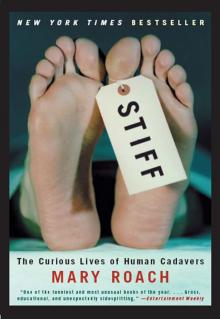 Stiff
Stiff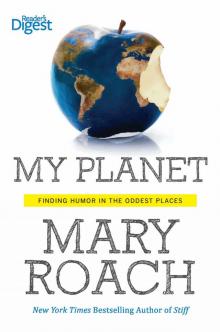 My Planet: Finding Humor in the Oddest Places
My Planet: Finding Humor in the Oddest Places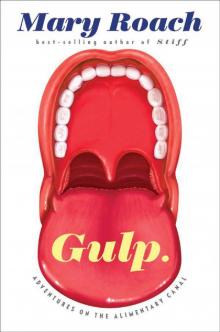 Gulp: Adventures on the Alimentary Canal
Gulp: Adventures on the Alimentary Canal The Best American Science and Nature Writing 2011
The Best American Science and Nature Writing 2011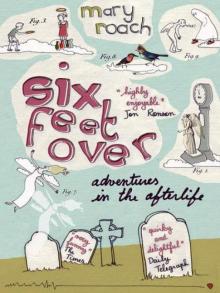 Six Feet Over: Adventures in the Afterlife
Six Feet Over: Adventures in the Afterlife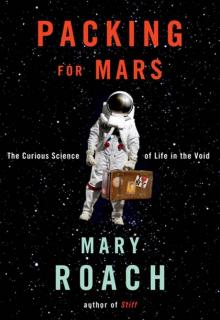 Packing for Mars: The Curious Science of Life in the Void
Packing for Mars: The Curious Science of Life in the Void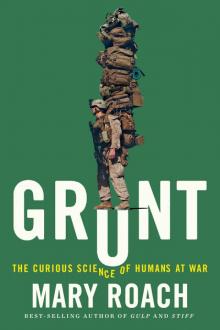 Grunt: The Curious Science of Humans at War
Grunt: The Curious Science of Humans at War